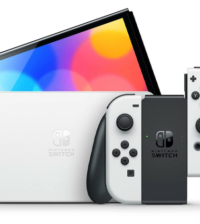February’s Video Game New Releases: A Legendary Month in the Making
Typically, these articles begin with a fun or creative way of introducing the month, often with a seasonal bend, but there’s no use describing February’s new video game releases with anything other than getting into it, being straightforward and direct: this month’s going to rock. Hard. There’s the obvious reason lying within the open-world RPG that’s been co-written by an actual household name in dark fantasy, as well as the wildly anticipated (exclusive) sequel to one of the best new IPs to come out in a long time, yet another open-world time sink. Alongside that, however, there are other new open-world games, several monumental expansions to longstanding shooters and MMOs, a number of appealing ports and releases in the racing and fighting genres … and the next-gen, immensely improved re-release of one of 2020’s most controversial games. An outstanding month all-around; let’s just get into it.

Dying Light 2: Stay Human — February 4 (PS 4,5; Xbox O/S/X; Switch; PC)
Many games have captured the intensity of the zombie apocalypse or smaller-scale takeovers of towns or buildings – from Resident Evil to Dead Rising and Dead Island — but even after those, there remained a consistent desire for a true, versatile open-world survival horror game within that setting. The studio behind Dead Island, Techland, then took another stab at the concept with Dying Light, meshing the refinement of their gory game philosophies from the previous title with the additions of parkour movement through the environment and a dynamic day-night cycle. This all comes together into a tense horror title with a convincing-enough amount of freedom to scratch that “zombie sim” itch, enough for Dying Light to receive a sequel in pursuit of even better thrills.
One area where Dying Light 2 aims to improve upon its predecessor is with storytelling, which it does by lightly rebooting the universe, jumping ahead 30+ years to a state where the world has eradicated the zombie disease, a mutated strand again escapes a lab, and most of humanity is wiped out. The player gains control of Aiden, who sets off to a European city in search of his sister, which drops the player in a post-pandemic playground that’s roughly 4x the size of the original Dying Light’s sandbox area. Armed with parkour skills and tools like grappling hooks and gliders, the player gets thrown into conflicts with factions across the city that activate a choice and consequence system, which shapes the narrative. Whether the familiar search-and-rescue tale will add anything remains to be seen, but everything else makes it seem like Dying Light 2 is a step up.
Cyberpunk 2077 — Next-Gen Re-Release (Xbox Series X and PS5)
At the tail end of 2020, after continuous delays and a draining year like no other, many gamers were looking to Cyberpunk 2077 as the medicine that might cure all their ailments. CD Projekt Red had built a near-flawless reputation with their Witcher role-playing series, so the concept of them reviving a classic ‘80s tabletop RPG setting for a sci-fi RPG was … well, almost hard to believe. When it finally came out, folks were hit with a cold, hard truth: not only had CDPR delivered a game with myriad technical flaws and a lack of current-gen polish, they delivered a game packed with broken promises and missed marks in terms of the experience they were delivering. The disappointment was overwhelming, but for the most part players took the “Let’s come back to this later” approach instead of disavowing the studio.
Well, “later” is now. It might be nearly a year and a half later, but the recent update to Cyberpunk 2077 just before its official next-gen upgrade release on Xbox Series X and PlayStation 5 this month has dramatically overhauled the game’s systems, atmosphere, and overall experience. Those looking for a different RPG than what was there at launch might still not be satisfied; it hasn’t magically turned into a choose-your-adventure game like Cyberpunk Fallout or something. For those who feel the game would be successful if it had a world that was more filled with life and the environment and people organically reacted to in-game actions, if weapons were overhauled for balance and combat AI was improved, if the player character could occupy other living space hubs and more extensively change their appearance on the fly … ? They might be ready to jump into Night City, for the first time or as a return.
Don’t take my word for it: Check Out the Notes for Patch 1.5.

Horizon: Forbidden West — February 18 (PS4,5)
There’s a special feeling that comes around when a title surprises the video game community, when a lower-key studio delivers on ambitious ideas to create something entirely new, satisfying, and iconic. Guerrilla Games – known for the Killzone series – pulled this off in grand fashion with Horizon: Zero Dawn, the PS4 exclusive that blends primal/tribal tones with advanced mech and tech across an open-world landscape. Despite being released almost exactly at the same time as Breath of the Wild, Horizon remains in people’s minds for its layered combat, strong characterization, and unique landscape, begging for Guerilla Games to deliver a sequel that’ll push the hardware of next-gen systems.
Horizon: Forbidden West is that sequel, which takes the series protagonist Aloy into the region of California, Nevada, and Utah for its new open-world explorable area within the post-apocalyptic setting, populated by dominant advanced machines and secluded human tribes. Naturally, Guerilla Games wants to preserve as much of what works from the first entry as they can while adding new features, so they’ve given Aloy new and improved methods of exploration – underwater, rock climbing – as well as tightened combat mechanics and tool implementation. They’ve also spruced up the graphics, and despite the early harsh memes about Aloy appearing … chubbier than she was in the first game, it looks absolutely stunning.
GRID Legends — February 25 (PS4,5; Xbox O/S/X; PC)
We’re shifting gears at the end of the month into a noteworthy racing game from Codemasters, GRID Legends. It’s noteworthy for a number of reasons: it will feature over 125 routes in both real circuits and manufactured ones in hallmark cities, as well as over 100 different vehicles at their disposal; it’ll feature a race creation feature for the first time; it’ll have a documentary-inspired narrative/career mode with established actors and a mixing of real and CG people; and it’ll offer cross-platform and cross-generational online multiplayer. The arcade street racer is showcasing a lot of ambition for its fifth installment and as a longstanding predecessor to Codemasters’ other street racers.
GRID Legends is also noteworthy for being the first title in the franchise released under Codemasters’ new publishers and owners, EA, and it’s also the first title in general from Codemasters that’d potentially have substantive input from the gaming giant into its development, if they were to get involved. In general, the developers have a record of reliability with their games, ranging in quality but always being reputable and enjoyable entries in the racing genre. Here’s hoping the trend continues under the new guard and that GRID Legends lives up to its potential.

Elden Ring — February 25 (PS4,5; Xbox O/S/X; PC)
Look, it’s hard not to get hyped up about certain games. Common sense should tell players to temper expectations when it seems like something could be really, really good … but life’s short and enthusiasm can be much more fun than pragmatic calmness. One of such situations comes at the end of February when the folks at FromSoftware, responsible for the Souls line of games and for essentially creating a subgenre of challenging dungeon crawler RPGs, will be delivering another new title for both Xbox and PlayStation consoles with Hidetaka Miyazaki at the helm, Elden Ring. That by itself is exciting, but it’s the other half of the equation that really gets the blood flowing: the worldbuilding will be handled by none other than Mr. Game of Thrones himself, George R.R. Martin. Say what you will about the timeliness of his novels, but it’s hard to argue with the man’s ability to flesh out a dark fantasy world.
When it comes to the gaming innards of Elden Ring, it sounds a whole lot like a continuation of the Souls formula that’s worked so well for FromSoftware, seen in its successes outside the franchise in Bloodborne and Sekiro. On top of the merciless, tactical hack-‘n-slash fantasy combat that’s part of the DNA of the studio’s titles, they’re also incorporating stealth combat – a component of Sekiro – and mounted combat atop the character’s mount, their chief method of travel across the landscape. Customization of the third-person battle experience will be key, though, and the director has stated that it’ll be “richer” than in his previous games, from skills to weapons. Hype’s a dangerous thing and it’s almost a certainty that Elden Ring won’t live up to it, but boy, the potential’s there for it to be great.
Along with a slew of heavy-hitting titles, February also comes with an impressive rush of expansions for other titles. Dynasty Warriors 9 gets its Empires expansion on February 15, and on the same day BioWare Austin and EA will be releasing their hype-up Legacy of the Sith addition to Star Wars: The Old Republic. Perhaps more high-profile, however, is the hotly anticipated and heavily pre-ordered Destiny 2: The Witch Queen expansion from Bungie, the game’s sixth expansion that’s finally seeing the light of day after getting delayed by COVID-19. A number of great games are also getting appealing ports, such as the entire Life is Strange: Remastered collection for the PS4, Xbox One, PC an Stadia on February 1, as well as the Assassin’s Creed Ezio Trilogy for the Switch on February 17. Fighting fans will also have a new King of Fighters, KOF XV, to engage on February 17.












